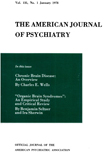A PSYCHOMETRIC DETERMINATION OF ALCOHOLIC ADDICTION
Abstract
There is a need for an objective test to identify the alcoholic addict. Such a test undoubtedly would conserve personnel and time within large screening programs. In clinical practice, such a test might be valuable as a therapeutic device.
A 60-question test, called the Alcadd Test, was constructed and used. In the present study, 123 alcoholics were compared with 159 nonalcoholics on the Alcadd Test. The 2 groups were relatively comparable in age, intelligence, and socioeconomic status. Illiterates, mental defectives, psychotics, and deteriorated individuals were not used.
The following conclusions have been drawn:
1. A paper-and-pencil test, simple to administer, score, and interpret has been found useful in the identification of the alcoholic addict.
2. Highly significant statistical differences in mean scores on this test were found to exist when alcoholics were compared with social drinkers and abstainers. Significant differences also were found when social drinkers and abstainers were compared.
3. The Alcadd Test made approximately 97% correct predictions of alcoholics and 94% correct predictions of social drinkers. It predicted 100% correctly for the abstainers.
4. Using the shorter approximation of the Richardson-Kuder formula, a coefficient of reliability of .92 was found for the males and .96 for the females.
5. A subjective analysis of the 60 items on the Alcadd Test revealed 5 characteristics of the alcoholic addict. They were as follows: (a) regularity of drinking, (b) preference for drinking over other activities, (c) lack of controlled drinking, (d) rationalization of drinking, and (e) excessive emotionality.
6. Male alcoholics appear to be more consistent drinkers and show stronger preferences for drinking than do female alcoholics. Female alcoholics show much less control over their drinking, more rationalizations for their drinking, and more emotional immaturity than male alcoholics.
7. Abstainers consistently make lower scores on the 5 alcoholic characteristics than do both alcoholics and social drinkers.
8. The Alcadd Test can be completed in less than 10 minutes and scored in 2 or 3 minutes. A profile of the 5 traits can be immediately constructed.
Access content
To read the fulltext, please use one of the options below to sign in or purchase access.- Personal login
- Institutional Login
- Sign in via OpenAthens
- Register for access
-
Please login/register if you wish to pair your device and check access availability.
Not a subscriber?
PsychiatryOnline subscription options offer access to the DSM-5 library, books, journals, CME, and patient resources. This all-in-one virtual library provides psychiatrists and mental health professionals with key resources for diagnosis, treatment, research, and professional development.
Need more help? PsychiatryOnline Customer Service may be reached by emailing [email protected] or by calling 800-368-5777 (in the U.S.) or 703-907-7322 (outside the U.S.).



